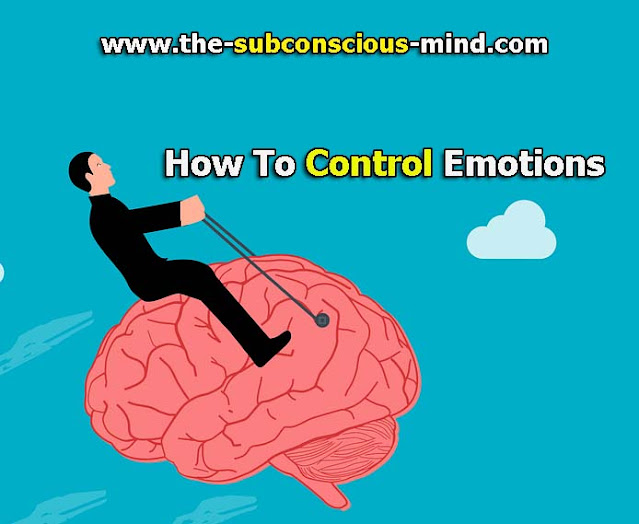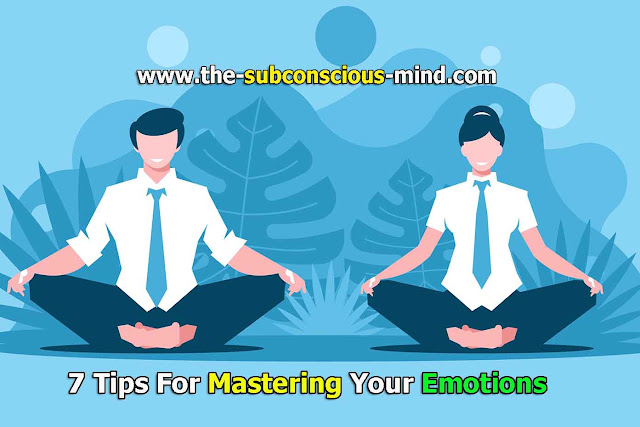 |
| how to control your emotions |
how to control your emotions - Friends, many times even without wanting, we get carried away in emotions and are unable to take the right decision. How to Control Emotions: In this article you will know; How can you control your emotions, your feelings, so that you can take the right decision? Or take the right decision in your personal or professional life. how to control emotions, how to control your emotions,how to control my anger, how to control mood swings
In today's article you will know...
- 3 Best Ways To Control Emotions
- Ways To Control Emotions
- 7 Tips For Mastering Your Emotions
- Side Effects Of Being Over Emotions
- Instead Of Suppressing Emotions, Express Them At The Right Place
3 Best Ways To Control Your Emotions
If you are easily emotionally affected and you find it difficult to control your emotions until we let those emotions get away from us. Emotions can be extraordinarily powerful, so learning to control them is equally powerful. Too much emotion affects your thoughts too much, due to which you can take wrong decisions. When you learn to control your emotions, you feel more positive, even in negative events that affect you. Let us know those methods which will help you to control your emotions.
Ways To Control Your Emotions
Do not take any decision in haste knowing your limits and control.
First of all accept your emotional state. After that understand what you can do about it, what you are getting passionate about. You don't have to resist your sentimentality under any circumstances but understand the situation. If someone in your office or in your friends circle sometimes laughs or says something in anger, then you should avoid reacting immediately on it.
It is better that you keep your mind calm, think for some time what should I do or say. Once you stop reacting immediately, you will be able to avoid over-emotion. For this, whenever you find yourself very emotional, immediately take a long breath and exhale slowly, this will calm your mind, only then take a decision.
Keep calm and take a deep breath.
Whenever you find yourself getting overly emotional, try to calm yourself down. Whenever you are emotional, your breathing becomes out of control. Take deep breaths to calm yourself down. Hold the breath for 1 or 2 seconds, then slowly release the breath through your mouth.
Explain yourself.
No one else knows as much as you know yourself, so identify your emotion and try to explain yourself. Sit alone for some time looking at a quiet place and explain to your mind how to control your emotions. If possible, talk to yourself by speaking to yourself.
Related Post:
 |
| how to control your emotions |
7 Tips For Mastering Your Emotions
Do you often feel overwhelmed and unable to control your emotions? If so, you are not alone. Managing your emotions is one of the most difficult aspects of life. Fortunately, with a few simple strategies, you can learn to take control of your emotions and master them. In this blog post, we will discuss seven tips for mastering your emotions and leading a more balanced life. By implementing these techniques, you will be better equipped to handle any emotional situation that comes your way.
1. Recognize Your Emotions
The first step to mastering your emotions is to recognize them. It can be difficult to identify and understand our feelings, especially when we’re in the midst of experiencing them. However, it’s important to take the time to recognize what you are feeling and why. This can help you become more aware of your emotions, allowing you to respond to them in a more mindful and conscious way. To help identify your emotions, try taking a few moments to pause and take deep breaths. Ask yourself questions such as: What am I feeling right now? Is this feeling familiar? Can I trace it back to any particular event or situation? Taking the time to recognize your emotions will help you better manage them.
2. Don't Bottle Up Your Emotions
We all have emotions, and it's important to acknowledge them in order to stay mentally healthy. Bottling up your emotions is never a good idea. If you don't express how you're feeling, it can lead to an accumulation of negative feelings which can eventually have a negative impact on your mental health. The best way to manage your emotions is to express them in healthy ways.
Take the time to recognize your emotions and talk about them with someone who you trust. This could be a friend, family member, or even a therapist. Talk about how you are feeling, and why you are feeling that way. Expressing your emotions will help to reduce the intensity of your feelings and also allow you to gain insight into why you feel the way you do.
If you don't have anyone to talk to, writing down your thoughts and feelings can be an effective alternative. Writing down your thoughts and feelings can help to identify patterns in your behavior and provide you with insight into why you are feeling a certain way.
By expressing your emotions in healthy ways, you can begin to take control of your emotions rather than allowing them to control you. Don't bottle up your emotions - take the time to recognize, express, and understand them.
3. Don't Try to Mask Your Emotions
When we try to mask our emotions, it can be a sign that we're not comfortable with how we feel. It's important to recognize and accept your feelings, no matter what they are. When we try to suppress or push down our emotions, it can be damaging in the long run. Suppressing your emotions can lead to emotional exhaustion, depression, and stress.
Instead of masking your emotions, try to recognize them and understand why you're feeling a certain way. Then, you can work on managing and expressing them in a healthy way. This may mean talking to a close friend or family member, engaging in mindful activities, or even seeking professional help.
No matter what you're feeling, it's important to acknowledge and accept it before trying to mask it. Once you do that, you can move forward with healthier coping strategies and come to terms with your emotions.
4. Be Mindful of Your Triggers
One of the best ways to control your emotions is to be aware of what triggers them. Triggers can be anything from certain people, places, or situations. Recognizing what causes you to feel strong emotions can help you take steps to avoid those situations and manage your emotions more effectively.
It’s important to identify what triggers your emotions and then make an effort to change or avoid them. This can help you get a better handle on your emotions and avoid unnecessary outbursts. Keeping a journal of when and why you felt a certain way can also be useful in recognizing your triggers.
Being mindful of your triggers can be difficult at times, but it’s essential for mastering your emotions. You may have to try different strategies until you find something that works for you. With some practice and dedication, you can learn how to control your emotions in challenging situations.
5) Don't Dwell On Your Emotions
It is easy to get stuck in our emotions and keep replaying them over and over again. This only serves to amplify the feelings and can lead to a downward spiral of negative thinking. When you feel yourself dwelling on your emotions, try to shift your focus away from them.
Focus instead on something positive such as an activity that brings you joy or a person that makes you smile. You can also try to engage in some deep breathing exercises to help take your mind off of the situation and refocus it on the present moment. Remember, your emotions are not permanent; they will come and go. Allowing yourself to experience them without dwelling on them will help you better manage them.
6. Accept Your Emotions
It’s easy to get overwhelmed when trying to control your emotions, but one of the most important steps you can take is to accept them. All of us feel a range of emotions throughout the day and denying them or wishing they weren’t there will only make it harder to manage them in the long run.
Acceptance means recognizing that emotions are normal, valid and part of being human. Instead of pushing them away, work on learning how to understand and embrace them. This might include using mindfulness techniques to observe your feelings without judgment and allow them to pass without resistance.
When you learn to accept your emotions, it gives you the power to choose how you want to react to them. You can use the time and space between feeling an emotion and responding to it to assess the situation and make better decisions. Rather than lashing out, you can take a step back, slow down, and think about how best to move forward.
Once you learn to accept your emotions, it makes it easier to develop skills for dealing with them more constructively. This allows you to build better relationships, become more resilient and ultimately create a life that is both meaningful and fulfilling.
7. Seek Professional Help if Needed
It is important to recognize when your emotions are getting out of hand and that you may need help to better understand them. If this is the case, consider seeking professional help from a therapist or counselor. Working with a trained mental health professional can be beneficial in learning how to cope with strong emotions and managing difficult situations.
A mental health provider can also provide practical tips for controlling emotions, as well as creating a safe space for you to share and explore your feelings. They can also help you identify what may be causing your emotions, so that you can work on ways to prevent them from coming up again in the future. Lastly, if your emotions are severe and unmanageable, seeking professional help can be essential for staying safe.
Side Effects Of Being Over Emotions
More emotionality gives rise to stress and negative thoughts. Being overemotional also has a negative effect on the heart, which can lead to chest pain and high blood pressure, insomnia. Being overly emotional leads to a lack of energy in the body. Sometimes, emotions and stress can lead to gastroenterological problems. At the same time, many minor problems such as complaints of stomach pain, nausea or vomiting are felt. Digestive problems start. Due to the stress caused by excessive emotionality, gradually the immune system of the person is also affected. An overly emotional person gets nervous at the slightest difficulty and is prone to negative thoughts.
Instead Of Suppressing Emotions, Express Them At The Right Place
In this article, I do not mean at all that you should give medicine to your feelings or you should become rigid. If I tell you that you should not allow yourself to be an emotional person, then it will not make any sense because a person needs to be emotional but you can control your emotions, although in real life It is not so easy to control emotions, but the right place and environment is also necessary for you to express your feelings.
If you have to take a decision, then go beyond your emotions and take a decision. Controlling emotions is an art in itself. By expressing your feelings at the right place, your feelings are neglected and your feelings are also appreciated.



